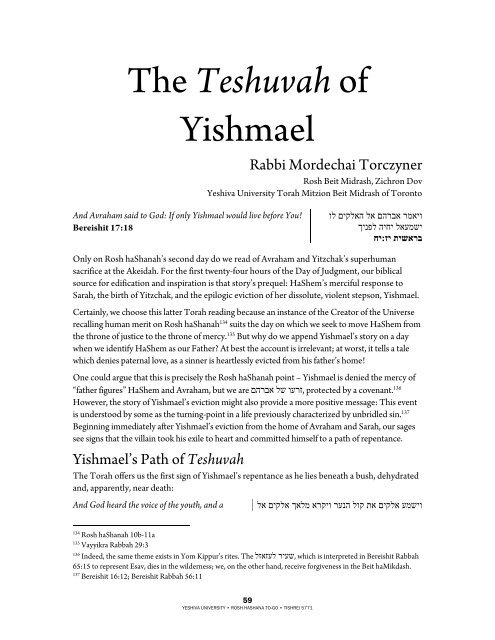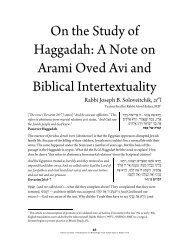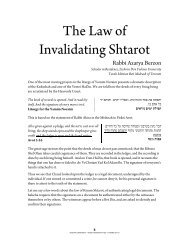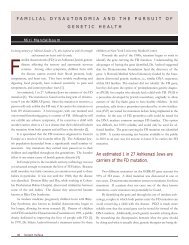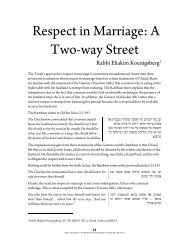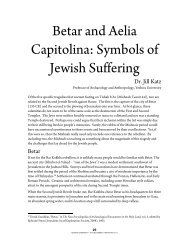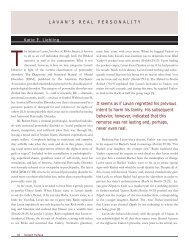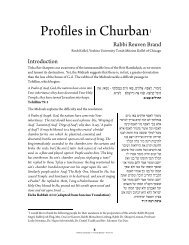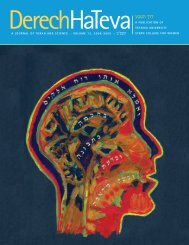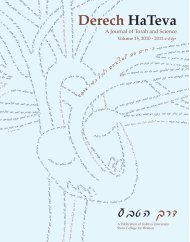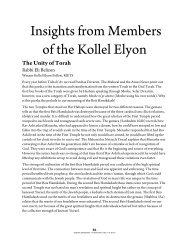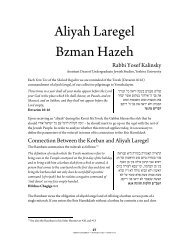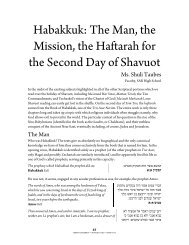YESHIVA UNIVERSITY • ROSH HASHANA TO-GO ... - YUTorah.org
YESHIVA UNIVERSITY • ROSH HASHANA TO-GO ... - YUTorah.org
YESHIVA UNIVERSITY • ROSH HASHANA TO-GO ... - YUTorah.org
You also want an ePaper? Increase the reach of your titles
YUMPU automatically turns print PDFs into web optimized ePapers that Google loves.
The Teshuvah of<br />
Yishmael<br />
And Avraham said to God: If only Yishmael would live before You!<br />
Bereishit 17:18<br />
Rabbi Mordechai Torczyner<br />
Rosh Beit Midrash, Zichron Dov<br />
Yeshiva University Torah Mitzion Beit Midrash of Toronto<br />
59<br />
<strong>YESHIVA</strong> <strong>UNIVERSITY</strong> <strong>•</strong> <strong>ROSH</strong> <strong>HASHANA</strong> <strong>TO</strong>-<strong>GO</strong> <strong>•</strong> TISHREI 5771<br />
ול םיקלאה לא םהרבא רמאיו<br />
ךינפל היחי לאעמשי<br />
חי:<br />
זי תישארב<br />
Only on Rosh haShanah’s second day do we read of Avraham and Yitzchak’s superhuman<br />
sacrifice at the Akeidah. For the first twenty-four hours of the Day of Judgment, our biblical<br />
source for edification and inspiration is that story’s prequel: HaShem’s merciful response to<br />
Sarah, the birth of Yitzchak, and the epilogic eviction of her dissolute, violent stepson, Yishmael.<br />
Certainly, we choose this latter Torah reading because an instance of the Creator of the Universe<br />
recalling human merit on Rosh haShanah 134 suits the day on which we seek to move HaShem from<br />
the throne of justice to the throne of mercy. 135 But why do we append Yishmael’s story on a day<br />
when we identify HaShem as our Father? At best the account is irrelevant; at worst, it tells a tale<br />
which denies paternal love, as a sinner is heartlessly evicted from his father’s home!<br />
One could argue that this is precisely the Rosh haShanah point – Yishmael is denied the mercy of<br />
“father figures” HaShem and Avraham, but we are םהרבא לש וערז, protected by a covenant. 136<br />
However, the story of Yishmael’s eviction might also provide a more positive message: This event<br />
is understood by some as the turning-point in a life previously characterized by unbridled sin. 137<br />
Beginning immediately after Yishmael’s eviction from the home of Avraham and Sarah, our sages<br />
see signs that the villain took his exile to heart and committed himself to a path of repentance.<br />
Yishmael’s Path of Teshuvah<br />
The Torah offers us the first sign of Yishmael’s repentance as he lies beneath a bush, dehydrated<br />
and, apparently, near death:<br />
And God heard the voice of the youth, and a לא םיקלא ךאלמ ארקיו רענה לוק תא םיקלא עמשיו<br />
134 Rosh haShanah 10b-11a<br />
135 Vayyikra Rabbah 29:3<br />
136 Indeed, the same theme exists in Yom Kippur’s rites. The לזאזעל ריעש, which is interpreted in Bereishit Rabbah<br />
65:15 to represent Esav, dies in the wilderness; we, on the other hand, receive f<strong>org</strong>iveness in the Beit haMikdash.<br />
137 Bereishit 16:12; Bereishit Rabbah 56:11


